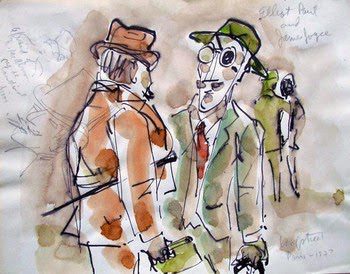“Head and shoulders above the others”: What James Joyce Thought of Leo Tolstoy
I only share books I know and love. If you buy through my links, I may earn a commission (learn more).

Image by Stephen Longstreet of Elliot Paul and James Joyce, 1927
As shared by Richard Ellmann in his definitive biography of Joyce, in September 1905, at the age of 23, James Joyce wrote to his brother Stanislaus:
As for Tolstoy I disagree with you altogether. Tolstoy is a magnificent writer. He is never dull, never stupid, never tired, never pedantic, never theatrical! He is head and shoulders over the others. I don’t take him very seriously as a Christian saint. I think he has a very genuine spiritual nature but I suspect that he speaks the very best Russian with a St Petersburg accent and remembers the Christian name of his great-great-father […]
He goes on to add, in a rather wonderful defence of Tolstoy,
A writer in the Illustrated London News sneers at Tolstoy for not understanding WAR. ‘Poor dear man!’ he says. Now, damn it, I’m rather good-tempered but this is a little bit too much. Did you ever hear such impudence? Do they think the author of Resurrection and Anna Karénin is a fool? Does this impudent, dishonourable journalist think he is the equal of Tolstoy, physically, intellectually, artistically or morally? The thing is absurd. But when you think of it, it’s cursedly annoying also. Perhaps that journalist will undertake to revise Tolstoy more fully – novels, stories, plays and all.
This letter is quoted in the brilliant James Joyce by Richard Ellman (1983, p209-10), the go-to biography of Joyce. The book is exceptionally long at 887 pages in paperback, but it’s incredibly well-researched and I’d recommend it to anyone keen to know more about Joyce.
It also has a superb intertextual level – as in the letter about Tolstoy above – and does much to honour the favourite authors and books of Joyce. In a well-written biography, I always see this as a great addition.
For more on James Joyce, you might like my tips for reading and understanding his writing, alongside my look at how his daughter Lucia’s schizophrenia might have inspired Finnegans Wake.
